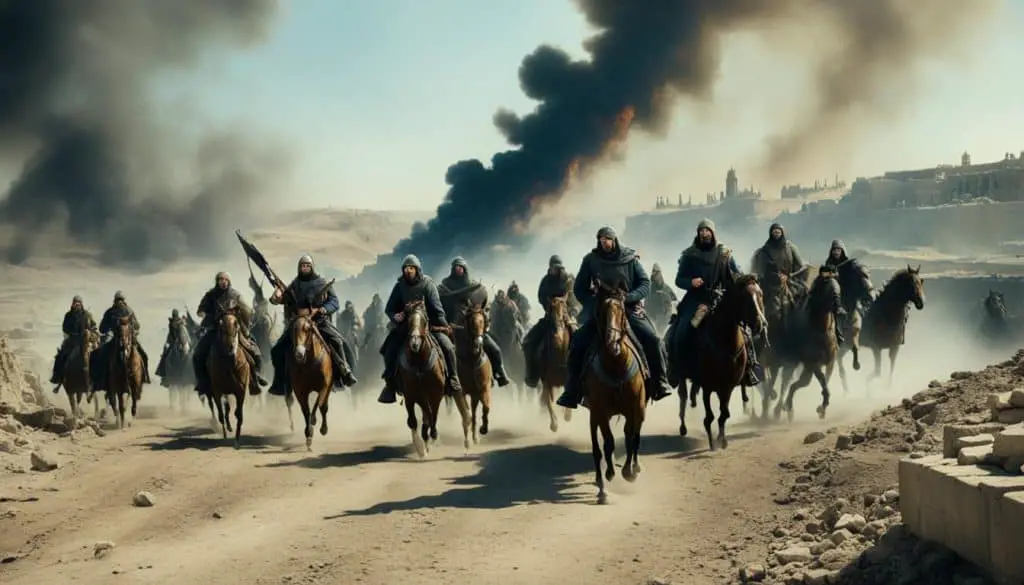Table of Contents
Israel has a long history of facing challenges and oppression by foreign nations. These experiences have deeply influenced the country’s identity and strength. We’ll look into seven major times when this oppression occurred. Can you guess which nations were involved in these events?
We invite you to explore these stories with us. You’ll learn about the victories, the sacrifices, and how Israel showed its strength. Discover the challenges that tested their beliefs and shaped their future. We’ll examine the effects of foreign oppression on Israel’s history.
Egyptian Slavery (Exodus 1:1-13)
In ancient times, the Israelites were slaves in Egypt for a long time. The Bible’s book of Exodus tells their story. They faced tough times as slaves of the EgyptiansEgyptian Slavery.
The Egyptian Pharaoh feared the Israelites might grow too strong. So, he made them work hard and treated them badly. This went on for many yearsEgyptian Slavery. Yet, the Israelites never lost hopeExodus 1:1-13.
“But the more they were oppressed, the more they multiplied and spread; so the Egyptians came to dread the Israelites and worked them ruthlessly.” – Exodus 1:12
They held onto their faith in God. They believed God would lead them to better days. This belief and their connection to their religion guided themExodus 1:1-13.
The image below shows just a small part of the Israelites’ tough time as slavesEgyptian Slavery.
The Israelites’ tale is about bravery and faith during hard times. Their story shows that hope and hard work can bring freedomExodus 1:1-13.
Canaanite Oppression (Judges 4:1-3)
After the Israelites arrived in the Promised Land, they faced tough times. The Canaanite king, Jabin, ruled over them for twenty years. This was a difficult period that tested their faith and determination.
“The Israelites did evil after Ehud’s death, angering the Lord. So, the Lord let Jabin, the Canaanite king, oppress them. Jabin’s commander, Sisera, had 900 iron chariots. The Israelites suffered for twenty years and cried out for help.”
The ruling Canaanites were cruel, using iron chariots to keep the Israelites down. The people pleaded with God for freedom. This part of their history shows the hard path they took to claim their promised land.
The Israelites’ challenges under the Canaanites helped define who they were. It showed they needed to trust in God’s help and guidance.
Now, let’s look deeper into the Canaanite oppression and how it affected the Israelite community.
The Canaanite King Jabin and Commander Sisera
King Jabin and Commander Sisera made life hard for the Israelites. With their powerful chariots, the Canaanites oppressed the Israelites even more.
The Israelites’ Cry for Deliverance
After twenty years, the Israelites couldn’t bear it anymore. They called out to God for help and freedom. Their faith in God’s power was strong.
God’s Intervention through Deborah
God chose Deborah to lead the Israelites out of oppression. Her wisdom and faith, along with Barak’s help, led them to victory.
Let’s explore more about the Canaanite oppression and how it ended. We will look into the context, Deborah’s role, and the key events.

Historical Context of Canaanite Oppression
The time of Canaanite oppression marked a critical period for Israel. It happened after they settled in the Promised Land, facing challenges from the Canaanites.
Deborah’s Leadership
Deborah, a prophetess and judge, was key during the oppression. Her leadership skills and connection to God motivated the Israelites to fight back.
The Confrontation with Sisera
The turning point was the battle between Israelites and Sisera’s army. Deborah’s prophecy and Barak’s leadership led to a great victory, breaking the Canaanite rule.
“On that day God defeated Jabin, the Canaanite king, through Israel. The Israelites fought hard until they overthrew Jabin.”
The Canaanite oppression taught the Israelites valuable lessons about faith and unity. Their deliverance showed the strength of trusting in God.
Midianite Oppression (Judges 6:1-6)
For seven years, the Midianites made life hard for the Israelites. They destroyed crops and animals. This caused the Israelites to struggle to survive.
It was a hard time for the Israelites. They were tested by the oppression. Their faith in God was challenged. Yet, they hoped for better days.
Finally, the Israelites prayed for help. Their prayers were answered through a man named Gideon. His leadership freed them from the Midianites.
This story reminds us of the Israelites’ strength and faith. It shows how they overcame great challenges with God’s help.
Biblical Passage: Judges 6:1-6
“The Israelites did evil in the eyes of the LORD, and for seven years he gave them into the hands of the Midianites. Because the power of Midian was so oppressive, the Israelites prepared shelters for themselves in mountain clefts, caves and strongholds. Whenever the Israelites planted their crops, the Midianites, Amalekites and other eastern peoples invaded the country. They camped on the land and ruined the crops all the way to Gaza and did not spare a living thing for Israel, neither sheep nor cattle nor donkeys. They came up with their livestock and their tents like swarms of locusts. It was impossible to count them or their camels; they invaded the land to ravage it. Midian so impoverished the Israelites that they cried out to the LORD for help.”
| Effects of Midianite Oppression | Implications |
|---|---|
| Devastation of crops and livestock | Severe economic hardship |
| Israelites forced to seek shelter in caves and strongholds | Displacement and fear |
| Continual invasions and destruction | Loss of livelihood and resources |
| Impoverishment of the Israelites | Desperation and dependence on divine intervention |
Ammonite Oppression (Judges 10:7-9)
The Ammonites ruled over the Israelites harshly for 18 years. It was a dark time for Israel, full of despair. The Israelites longed for freedom. They needed God’s help.
In their pain, they turned to God, realizing they needed Him. God was testing their faith. They were learning to trust Him for rescue.
“The Israelites cried out to the Lord,” Judges says, “‘We have sinned against you.’ But the Lord reminded them of past victories. He showed them He was still with them.” (Judges 10:7-9, NIV).
“We have sinned against you, forsaking our God and serving the Baals.”
They knew they had gone against God and asked for another chance. Despite their mistakes, God was still there for them. He showed them mercy and reminded them of His faithfulness.
Divine Deliverance
The Israelites remembered God had saved them before. They trusted He would do it again. Their prayers called for a hero. God responded by sending a judge.
Jephthah, a hero, led the Israelites against the Ammonites. With God’s help, they won. Hope was restored. The future looked brighter.
Lessons Learned
From the Ammonite oppression, the Israelites learned they must follow God. They understood the cycle well: sin brings hard times, but seeking God’s face brings rescue and peace.
This story also teaches us about never giving up on God. Even in dark times, the Israelites kept their faith. Their steadfast belief in God brought freedom. It’s a story that inspires.

Let’s take to heart the Israelites’ faith and God’s faithfulness. Their story is an encouragement to us. It tells us to trust God in our struggles. He will lead us to freedom and redemption.
Philistine Oppression (1 Samuel 4:1-11)
During the time of Philistine oppression, the Israelites were controlled by the Philistines. This struggle is described in 1 Samuel. It shows how the Philistines’ power affected the Israelites’ faith and who they were.
The Philistines were strong and had a developed society. They took the Ark of the Covenant from the Israelites. The Ark was a holy symbol of Israel’s connection with God.
The Israelites felt heavy under Philistine rule. They wanted to be free and to strengthen their faith again. They hoped for a leader to save them and help them remember they were chosen by God.
But the Israelites kept their faith through tough times. They believed God would help them beat the Philistines. They held on to hope that God was with them.
“And it came to pass, when Samuel was old, that he made his sons judges over Israel… And the children of Israel went out against the Philistines to battle… So the Philistines fought, and Israel was smitten, and they fled every man into his tent: and there was a very great slaughter… And when the people were come into the camp, the elders of Israel said, Wherefore hath the LORD smitten us today before the Philistines?”
The Israelites begged for help against the Philistines. They turned to their prophet and leader, Samuel. With his help, they found their purpose again and became stronger in their faith.
When the Israelites fought back, it marked a key moment for them. This time pushed them to trust in God more and taught them the value of good leadership. They vowed to fight to regain their standing as God’s chosen ones.

The Battle of Ebenezer
Desperate, the Israelites confronted the Philistines in battle. This clash is known as the Battle of Ebenezer.
Sadly, the Israelites lost. This defeat was hard, causing many to die and deepening their sorrow. They saw clearly they needed God’s help and a new plan to shake off the oppression.
The Restoration of the Ark
Durign the Philistine rule, getting back the Ark was big news. The Philistines, who had taken the Ark, were then troubled by disasters. They knew the Ark was a sign of the Israelites’ God.
Under this truth, the Philistines returned the Ark. They hoped to stop the tragedies they faced. This gesture marked a big success for the Israelites. It showed their bond with God was restored.
Getting back the Ark turned things around for the Israelites. It boosted their faith and mission. It was a key moment in leaving the Philistine oppression behind for good.
Assyrian Captivity (2 Kings 17:5-6)
The Assyrian Empire took over northern Israel during the Assyrian Captivity. This action was a big moment in Israel’s story. The Assyrians forced the Israelites out and brought in other people. This caused the Israelites to scatter and lose their culture.
In 2 Kings 17:5-6, we learn about this big change. It ended Israel’s power in the north and started a tough time for the Israelites. They lost their land, culture, and freedom. Assyria scattered them all over, starting a diaspora.
This event reminds us of the dangers of not following what we know is right. Israel’s turning away from God led to their fall. They started following other gods and adopting foreign customs. This made them lose their freedom to Assyria.
“…because they did not obey the voice of the LORD their God but transgressed his covenant, even all that Moses the servant of the LORD commanded. They neither listened nor obeyed.” – 2 Kings 17:6
The Assyrian rule completely changed the area’s power balance. They were a strong and dominating empire. Their conquests brought them a lot of influence in the Near East. It set the stage for future events in Israel and its surrounding regions.
The Assyrian Captivity was a turning point in Israel’s history. It was the start of tough times for the Israelites. It also led to the Babylonian Captivity later on. The rise and fall of empires in the area kept affecting Israel, showing its complex relations with other powers.
To know more about the Assyrian Captivity, let’s look at the timeline. This will show us when and how it all happened, and what came after.
Timeline of the Assyrian Captivity
| Year | Event |
|---|---|
| 732 BCE | Assyrian King Tiglath-Pileser III conquers the northern tribes of Israel |
| 722 BCE | Samaria, the capital of the northern kingdom of Israel, falls to the Assyrians |
| Deportation Period | The Assyrians forcibly deport Israelites to Assyria and other conquered regions |
| End of Israelite Sovereignty | The northern kingdom of Israel ceases to exist as an independent entity |
The Assyrian Captivity stands out in ancient Israel’s history. It shows what happens when people don’t stay true to their beliefs. But it also shows the Israelites’ ability to survive and learn from their mistakes.

Babylonian Captivity (2 Kings 25:8-11)
The Babylonian Captivity, detailed in 2 Kings 25:8-11, was a key time for the Jewish people. The Babylonians, led by King Nebuchadnezzar, destroyed Jerusalem and its temple. They took the Judeans into exile, where they lived under Babylon’s rule for seventy years.
This experience deeply affected the Jews’ cultural and religious identity. Stripped from their home and worship place, they faced big hurdles. Despite this, they held onto their faith, tradition, and hope drawn from their history and prophets’ teachings.
During their exile, the Jews’ community grew in significant ways. They innovated in their religious customs and built synagogues. They also gathered their stories and laws into the Torah. This period strengthened their faith and community bond.
After seventy years, the Persian Empire overtook Babylon. King Cyrus then allowed the Jewish people to go back and rebuild in Jerusalem. This event ended their time of exile and signaled a rebirth for the Jewish nation. They came back to their land, determined to restore their religious and cultural legacy.




